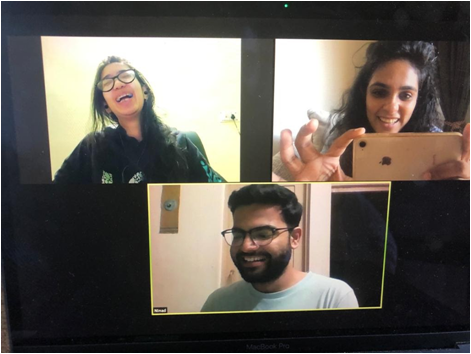In March 2020 when India went into lockdown, the ABC team was forced to go remote, like many other urban organisations. We have now been working from home for 9 months across 5 cities, figuring out how to collaborate with our partner organisations and maintain a healthy team dynamic as we go.
Initially, a lot of our efforts were directed towards understanding what the transition meant for each of us on an individual level, and consequently, for us as a team. Our much-cherished office environment -- the source of daily motivation, collectively-generated ideas and shared non-work experiences -- was now gone, and we had to learn how to replicate it at home and also online. This meant prearranging and scheduling the ‘impromptu moments’ that took place in the physical office environment - in the form of weekly team hangouts, regular, one-on-one check-ins, and frequent project meetings to ensure everyone was on the same page. We had to learn how to be sensitive to each other’s differing contexts - being patient with the messy spaces, routines, and responsibilities that come with being at home - while still ensuring we were setting high expectations and not compromising on the quality of work.
[To hear more about the team’s journey transitioning to work from home, check out Ep. 2: The ABCs of Remote Working at our podcasts page]
A team brainstorm session
Qualitative researchers with a completely remote assignment
Aside from learning how to work with each other online, the way we connect with our partner organisations also had to change. Meeting clients in-person was no longer an option, and day-long workshops were now unfeasible. We had to experiment to build a working relationship on zoom. We restructured day long workshops to shorter chunks over a week or sometimes even a month.
The experimentation process gave us the unique opportunity to evaluate the pros and cons of different training and interaction models. While in-person interactions with our partners are valuable, we also appreciated the positive impact of remote interactions. Meeting virtually enabled us to meet more regularly and informally. We were able to slowly build on concepts and ideas together. The virtual interactions allowed for much more flexibility with scheduling and of course shattered the barrier of geography altogether.
Glimpses from trainings and sessions with our partners
In addition to working remotely with our partners, we went a step further to help them engage online. Taking from our own experience and a whole lot of research, we helped pre-school teachers build a classroom environment for their toddlers online (read an interview with one of the teachers here), supported an organisation with engaging their volunteers in online trainings and meet ups, and also facilitated another partner in conducting co-creation workshops as a part of their strategy design. This meant further developing our own digital literacy, and passing it on to our clients in the most impactful way possible.
Little Wizards Preschool teachers conducting classes online
Of course, this transition was not without its challenges. We had to be mindful of people’s varying level of internet and technology access, as well as learn how to manage big groups and ensure zoom etiquette depending on the context.
However, despite the unfortunate circumstances in which we had to learn how to work remotely, we found several positive components to and outcomes of the process. Moving forward, we will definitely take these forward, and perhaps, like many others, even transition permanently to a hybrid work model! Despite uncertainties regarding what remote work will look like in the future, one thing is certain - working from home this year has made us more patient, empathetic and resilient - both as individuals and as an organization for the years to come.




